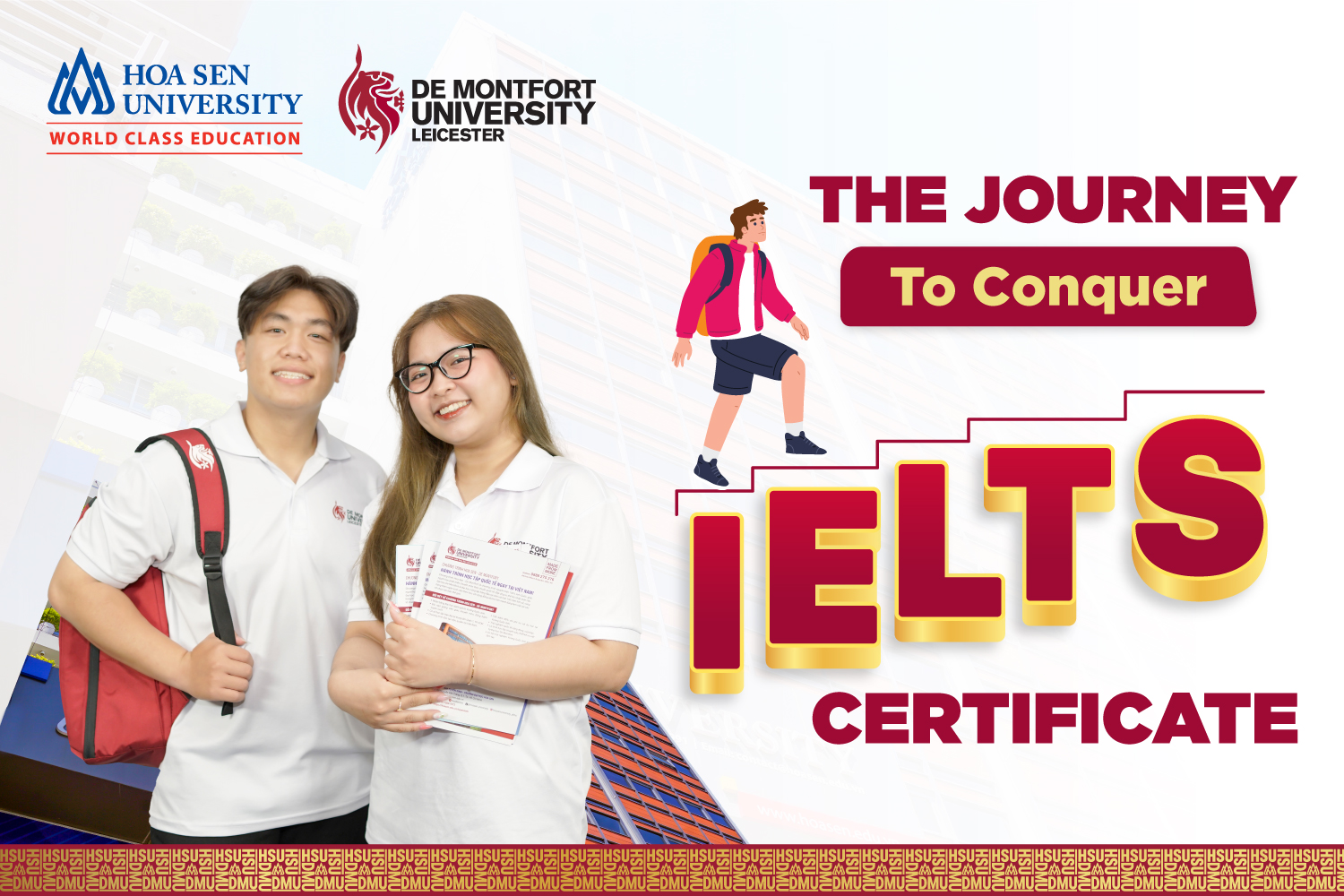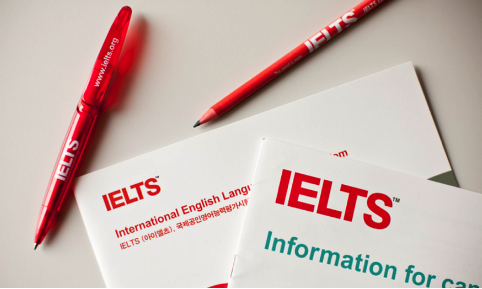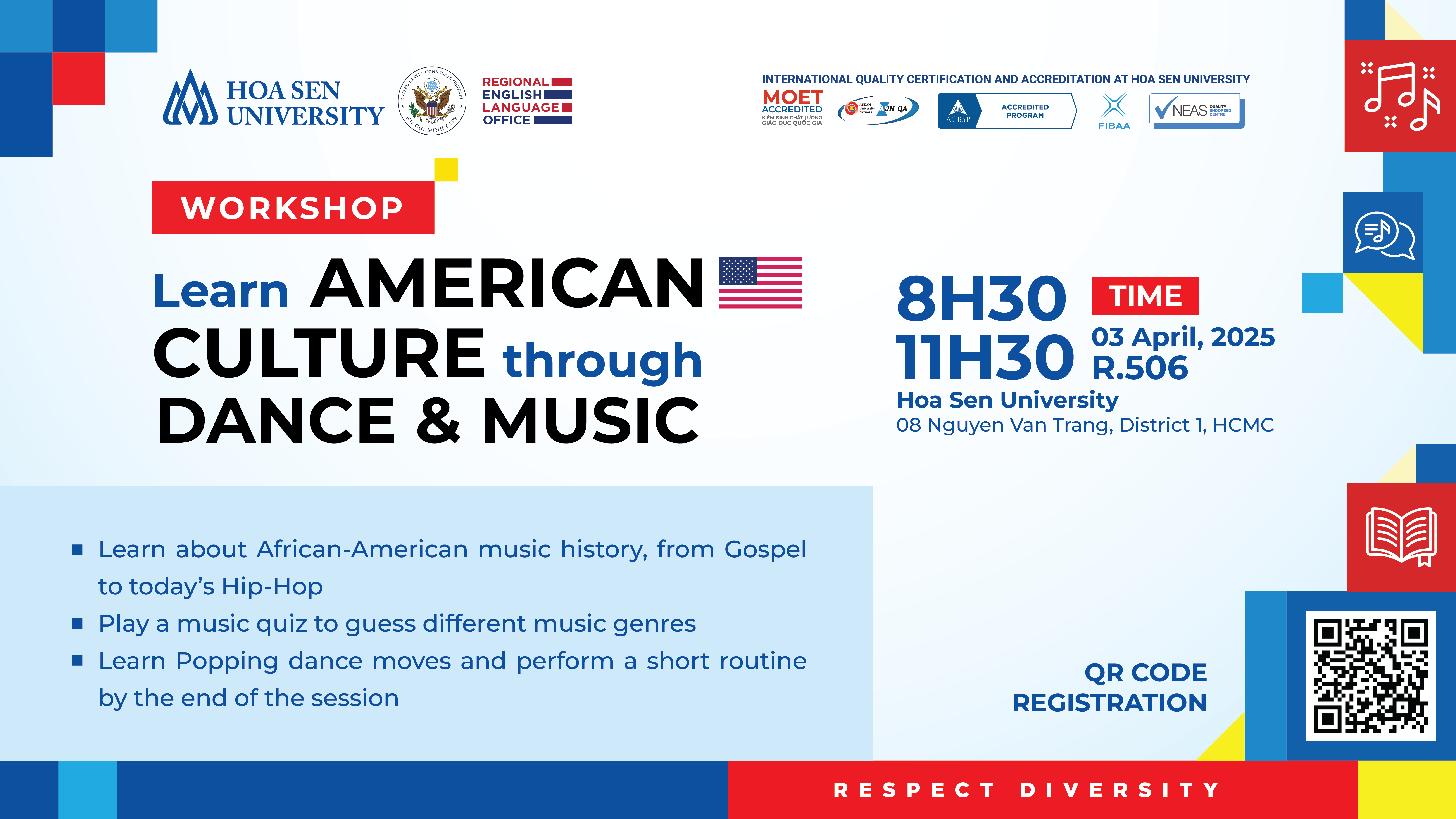The Journey To Conquer IELTS Certificate
In recent years, the IELTS certificate has consistently been the most searched keyword on Google among international language proficiency certificates. The “IELTS fever” has helped many students increase their chances of admission to their desired fields of study, exempting them from English language courses at universities, and even providing opportunities for scholarships up to 100%. Let’s explore together with the Hoa Sen – De Montfort Program how to conquer this certificate!

1. Mastering the structure of the IELTS certificate
The IELTS certificate, short for International English Language Testing System, is an international English proficiency testing system. This system assesses an individual’s proficiency in using English through four skills: Listening, Speaking, Reading, and Writing.
There are two types of IELTS certificates: IELTS Academic and IELTS General. IELTS instructors advise that parents should guide their children to take the IELTS Academic certificate, which is suitable for those who intend to study at schools in English-speaking countries, while the IELTS General certificate is for individuals intending to study, work, and live in English-speaking countries.
In terms of structure, a complete IELTS test lasts for 3 hours and includes four sections:
- Listening (40 minutes)
- Reading (60 minutes)
- Writing (60 minutes)
- Speaking (10-15 minutes)

2. The journey to conquer IELTS certificate
2.1. Building an English foundation
Pronunciation
To effectively listen to English, you need to have good pronunciation skills. To conquer the IELTS as a beginner, firstly, you need to familiarize yourself with the International Phonetic Alphabet (IPA) to have a better understanding of English phonemes. Next, start practicing pronunciation with Ann Cook’s “American Accent Training” (for American English) which provides detailed guidance on pronunciation skills, stress, and intonation. Additionally, you can enhance pronunciation effectiveness by practicing through Shadowing, mimicking pronunciation from the accompanying CD to the book. If you prefer to practice British English pronunciation, then “English Pronunciation in Use” by Cambridge would be a more suitable option for you.
Vocabulary
Expanding English vocabulary is a task that requires patience and time, not just focusing on pronunciation or grammar. However, you can start by learning from simple and familiar topics.
Traditional methods of vocabulary learning, such as writing down on paper, have proven to be very effective in reinforcing your word bank. Record new words on flashcards, notebooks, and repeat them daily. Try to understand the meaning of words in English (using Oxford or Cambridge dictionary), and provide specific examples of how to use them. This will help you remember the words more easily and use them accurately.
To memorize vocabulary effectively, continuous use of those words is essential. Start practicing thinking and expressing yourself in English, focusing on basic and familiar topics in everyday life to better prepare for starting IELTS certification from scratch.
Grammar
Grammar plays a crucial role in building the foundation for any language, helping learners understand and use the language accurately. To begin strengthening your grammar foundation, you should focus on key points such as:
- Verb tenses in English and how to use verbs
- Relative clauses
- Types of words and their usage
To better understand these grammar points, you can practice from basic grammar topics and practice regularly, incorporating all four skills of Listening, Speaking, Reading, and Writing.
An important thing to remember when choosing study materials for IELTS certification for beginners is to focus on the most appropriate and basic materials for each skill, to avoid confusion from using too many materials at once.
2.2. Getting used to IELTS Certificate task
Once you have acquired basic knowledge of English, it’s time to familiarize yourself with the types of tasks in the IELTS exam to help you prepare and practice for similar question formats, thus enhancing your test-taking abilities. Understanding the structure of the exam will help you devise a detailed practice plan and allocate time fairly for all four skills: Listening, Speaking, Reading, and Writing.
The listening section of the exam consists of 4 recordings, 40 questions in total.
The reading comprehension section comprises 3 passages, 40 questions in total.
The writing section includes 2 tasks, one with a minimum of 150 words and the other with a minimum of 250 words.
The speaking section of the exam has 3 parts, conducted in a 1-1 format between the candidate and an examiner.
2.3. Developing all four skills of Listening, Speaking, Reading, and Writing evenly
Many young people improve their English listening skills by listening to news, podcasts, watching movies on Netflix, or English YouTube channels. This method is truly effective, helping the auditory system become familiar with the new language quickly and improving reflexes, while making language learning enjoyable.
For Speaking skills, shadowing is an essential part of the IELTS certification process for beginners. By mimicking pronunciation, stress, and recording your voice, you can significantly improve pronunciation errors and sentence stress. Additionally, participating in English classes or clubs helps you practice speaking English regularly and improve your proficiency quickly.
To develop Reading comprehension skills, extensive reading is crucial. You can read news, articles on various topics in newspapers, English books to improve reading comprehension and expand vocabulary.
Writing skills are often considered the most difficult to improve in the process of studying for the IELTS certification. To start, focus on practicing various types of writing tasks within the IELTS framework. However, to develop writing skills effectively, it requires a lot of effort and patience to monitor progress.
Conclusion
Conquering the IELTS certification is a process that requires thorough preparation and patience. By understanding the exam structure, creating detailed study plans, using quality materials, and practicing regularly, you can achieve your goal. Obtaining the IELTS certificate not only unlocks international opportunities but also serves as evidence of your effort and determination.

If you’re interested in the “study abroad from home” method, make sure to follow our page to stay updated on useful information about the Hoa Sen – De Montfort Program! To receive more details about the program, please register here.
See more:
1. Scholarship Announcement 2024 – Hoa Sen – De Montfort Program
2. What is International Business? Learn what? Which school?
3. Hoa Sen – De Montfort Program Admission Methods 2024
——————————-
CONSULTATION CONTACT: Hoa Sen – De Montfort Program (Institute of International Education)
? Address: Room 1007, 10th floor, 08 Nguyen Van Trang, Ben Thanh Ward, District 1, Ho Chi Minh City
? Hotline: 0888 275 276
? Email: demontfort@hoasen.edu.vn
? Website: www.hoasen.edu.vn/demontfort/












